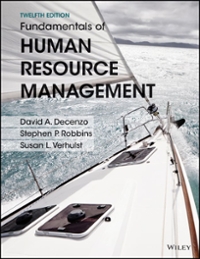Question
My personal goals for the next five years include: getting my wisdom teeth removed, moving across the country, finding a job in HR to start
My personal goals for the next five years include: getting my wisdom teeth removed, moving across the country, finding a job in HR to start my new career, buying a house, and getting married to my partner. Most of these goals will include a lot of money to accomplish. For that reason, I will be implementing a financial plan.
Currently, my financial situation is not ideal, but over the past year, I have taken steps to better my situation. I currently am living paycheck to paycheck earning minimum wage at my current job and have about $4500 in credit card debt ($1000 in a high-interest account, and $3500 in low-interest) and $35,000 in student loan debt, but I have about $3000 in savings and will be receiving about $2000 from my tax return next month. I am currently paying about $200 on my credit cards each month and try not to use them unless I have to, and I have an automatic transfer of $25 into my savings each month.
I am currently planning to get my wisdom teeth removed within the next few months, and I am planning to move and find a new job at the end of July this year, so I will want about $1000 to cover the dental expenses and $5000 to cover moving costs and cover expenses in the case that I am unable to find a new job right away.
My other two goals of buying a house and getting married are flexible timewise, but I would like to buy a house in 2022 and have a small wedding in 2023. To feel comfortable buying a house, I would like about $10,000 in combined savings and available credit on my low-interest credit card to cover a down payment and any unexpected maintenance expenses. For the wedding, I expect to spend about $5000, because I really just want to have a small party with close friends and family followed by an international honeymoon.
At this rate, I could have about $5000 in my savings if I choose to put my entire tax return into my savings, which would leave me with $4000 to go towards moving costs and could have my high-interest credit card paid off in about 8 months since I pay about $125 per month on it. However, I would rather pay off that credit card as soon as possible, so I would like to use half of my tax return to pay off the full amount and put the rest into savings. After leaving me with $3000, I will need to gather $2000 more by the end of July. Since I have 5 months until then, I will need to put $400 per month into savings. I do not think this is a viable option for me, so I will need to figure out where I can cut my current and future expenses, and possibly settle with having less in savings and risking relying on credit cards for moving expenses.
After moving and finding a new job, I can focus on buying a house and getting married. If I give myself two years to gather up $15,000 and pay off my low-interest credit card, this means that I will need to pay about $130 per month on my credit card and save $625 per month. Depending on how much my new job will pay and how much the cost of living will be where we move, this may or may not be possible. I will revisit and reevaluate this plan at that time.
Step by Step Solution
3.52 Rating (162 Votes )
There are 3 Steps involved in it
Step: 1
Prioritizing and Budgeting Focus on essentials Paying off highinterest debt should be your top priority Consider putting all your tax return and any e...
Get Instant Access to Expert-Tailored Solutions
See step-by-step solutions with expert insights and AI powered tools for academic success
Step: 2

Step: 3

Ace Your Homework with AI
Get the answers you need in no time with our AI-driven, step-by-step assistance
Get Started


